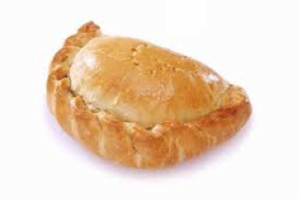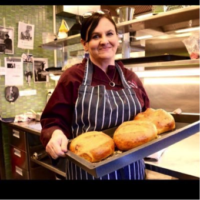On a visit to a BLP hub school in Cornwall this week I came across a remarkable story from Jo Wotton, the Saints Way MAT’s Catering Manager. In just three years she has evolved from being the disgruntled parent of five to a finalist in the BBC Cook of the Year category; part of the BBC Food and Farming awards. She and other kitchen staff took a learning journey of their own, demonstrating many of the learning characteristics we hope to build in our pupils.
Back in 2013, the school meals at St Tudy primary school in Cornwall were described as ‘beige’ and were so uninteresting that only 6 of the 60 children were eating them. As a parent of children at the school, Jo wrote on behalf of other parents to the headteacher, expressing their disappointment. The headteacher Karen Homes determined to visit the catering company that supplied the meals to see if they could be improved. Unfortunately the company simply didn’t understand the problem and so she and Jo decided that the children deserved better: the school should provide its own meals. Jo was appointed as The Saints’ Way MAT Catering Manager and a fellow parent (a trained chef) was taken on to cook the meals. Within 6 weeks, and with support from other parents, they were feeding not 6 but 50 children! They took the other small school kitchens into the fold, and by November 2013 this tiny enterprise had won an award for the best catering service by Cornwall Healthy School. In February 2014 the catering enterprise embraced all the schools in the Saints Way MAT including St Petroc’s with over 500 children. The enterprise had suddenly got rather larger!
Knowing nothing about school catering I wondered just what dispensing with a catering service and going it alone meant. The schools, said Jo, had to learn to ‘think for themselves’. Beforehand, using the large catering company, kitchen staff had to work with a strict manual of portion sizes, weights and measures of ingredients, all of which were carefully monitored. There’s little room for manoeuvre. Ditching the outside caterers and taking total control meant they had to create their own set of core menus and source their own ingredients. Staff had to move rapidly from being dependent on the heavy scaffolding of the manual, to being independent learners.
Jo and her teams formed a collective with other small schools in Cornwall and learned how to work with local suppliers. Now all the beef, lamb and pork they serve is locally produced. Their combined buying power means they can call the shots to make the produce healthier. Their Cornish pasties now have less salt, their burgers are all 100% chuck steak (gluten free and lower in fat), and their sausages have less sugar.
 But the story doesn’t end there. Back in St Tudy, staff were transforming the little kitchen into a community resource. Not just meals for the school’s children but meals for the pre-school group, a monthly community lunch and, most recently, Meals-on-Heels for the elderly in this rural community. To top it all, occasional Friday nights have become Take Away Night for local parents. They can buy ‘home made’ pizzas from the kitchen – a treat at the end of their busy week!
But the story doesn’t end there. Back in St Tudy, staff were transforming the little kitchen into a community resource. Not just meals for the school’s children but meals for the pre-school group, a monthly community lunch and, most recently, Meals-on-Heels for the elderly in this rural community. To top it all, occasional Friday nights have become Take Away Night for local parents. They can buy ‘home made’ pizzas from the kitchen – a treat at the end of their busy week!
It’s been a steep learning curve for Jo and the kitchen staff, but rewards and recognition are coming fast. Last December Jo was one of 10 people selected from thousands of primary schools to cook a meal at the House of Commons as part of the National School Meals Week. In April Jo was a finalist in the BBC Cook of the Year category of the BBC National Food and Farming awards. She didn’t win but she fortuitously met Sheila Dillon from the well-regarded Radio 4 Food Programme. Next week she is hosting a visit from the Swedish Minister of Agriculture who is coming to find out about cooking in small rural schools. And in a couple of weeks the aforementioned Sheila Dillon is spending a day with Jo researching the potential problems small schools will face now that their Small Schools Catering Grant of £2400, has been quietly removed from their budgets. You never know, but this may feature on the Food Programme in a few weeks time.
I never imagined writing about kitchens and school meals on a Building Learning Power blog, but what this delicious story has taught me is that it’s not just pupils or teachers or even senior leaders who are learning to learn in schools. Jo and her brave catering teams have rejected the ‘done to’ catering manual, the equivalent of worksheets for pupils, and are mastering the design of their own menus, sourcing the most appropriate food and becoming a valuable community resource. This learning journey is as big as any I have witnessed in a classroom. And rest assured, the beige boring meals are long gone.


No comments yet.